It depends on the correct choice of variety whether there will be a crop of sweet pepper or not. The culture is heat-loving, so in a temperate climate, bet should be placed on precocious and cold-resistant varieties. The selection of seeds is large. The main characteristics on which the crop depends are the ripening period, yield, and disease resistance.
Content
Crop Pepper Hybrids from Semko
Hybrids from the company Semko are distinguished by stable immunity. To obtain the declared yield, pepper must be fed at least 3 times per season:
- 2 weeks after transplanting into the soil, pour each seedling with a solution of superphosphate (0.5 l), water (10 l), fertilizer (2 tsp);
- flowering peppers - with liquid fertilizer (10 l of water) with the addition of urea (1 tsp), potassium sulfate (1 tsp), superphosphate (1 tsp);
- during ripening - with a solution of potassium salt (2 tsp), superphosphate (2 tsp), water (10 l).
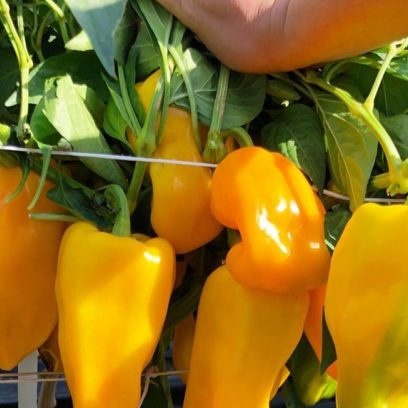
Hybrid Aries
A worthy hybrid - 7-14 kg / m². Aries is grown in open ground, greenhouses, tunnels. Before the collection, 110-120 days pass. The form is distinguished by resistance to the tobacco mosaic virus. Seedlings are transplanted to a permanent place when they reach the age of 50-60 days.
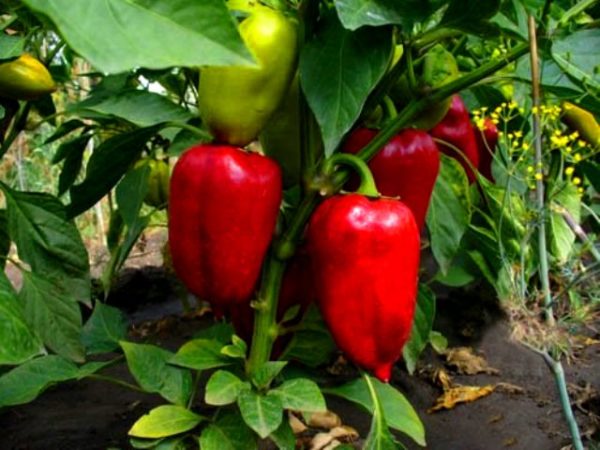
Bushes need support. When the bush is formed in 2-3 stems, the height is impressive - up to 2 meters. Other characteristics of F1 Aries:
- prismatic form;
- the skin is smooth with gloss;
- color is bright red;
- weight - 300 g;
- pericarp 8 mm.
The pulp has an excellent taste, the purpose is universal.
Orange beauty
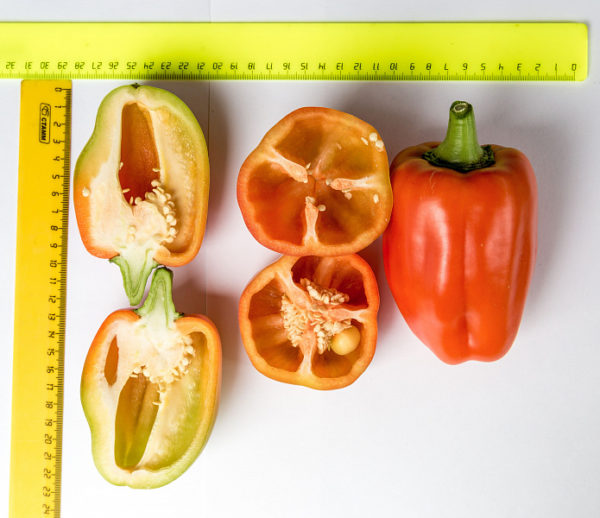
Matures early. On the 90-95 day, the phase of technical ripeness sets in. During this period, the skin color is light green. At about 115 days, a phase of biological ripeness sets in. The color turns orange. The shape of 30% of the fruits is cuboid-prismatic, the rest is cuboid. Chambers 4, wall thickness 9 mm, weight 180-200 g, the pulp is sweet, juicy, its composition:
- β-carotene - 9 mg;
- Vitamin C - 164 mg.
The form has genetic resistance to the causative agent of verticillin wilt. Orange beauty is grown for harvesting. Productivity 9 kg / m². The bush is tall (1 m), does not need to be formed, but it needs support.
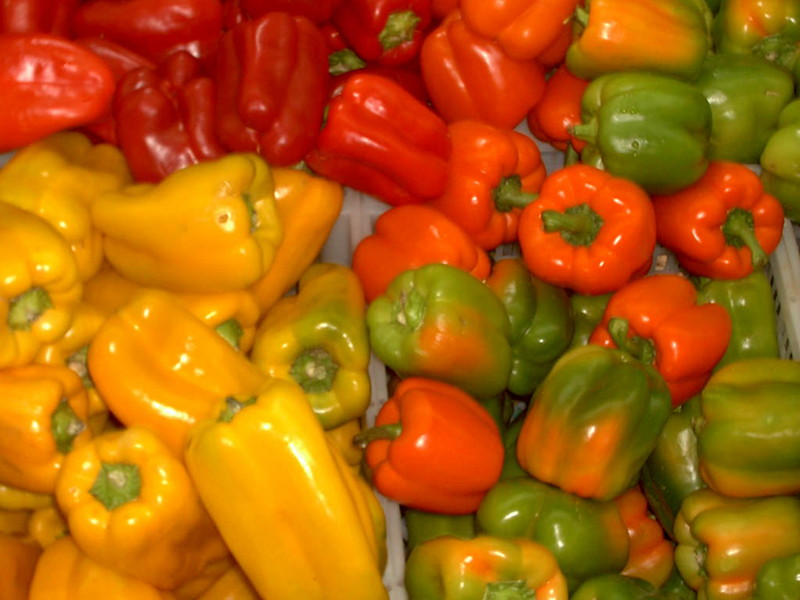 You may be interested in:
You may be interested in:Orien
Orien is a variety, so its seeds can be used for reproduction. Orien ripens early (95-100 days), is characterized by drought tolerance, heat resistance. It is grown in greenhouses and in soil. Productivity in the garden is 5 kg / m², in greenhouses - 9 kg / m².
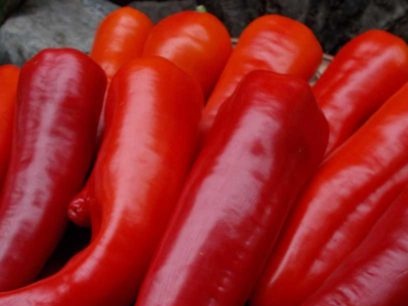
Bushes no higher than 60 cm, compact, no need to form. Fruits are long up to 24 cm with a diameter of 5 cm. Coloring varies from light yellow to bright red. Medium specimens weigh 125-140 g. Wall thickness 5 mm. The pulp is very sweet, aromatic, contains a lot of juice. The purpose of the variety is universal. The reviews are good.
Advantages and disadvantages
It is difficult to find flaws in hybrids of the Russian company Semko. They are enviable popular with vegetable growers. Appreciated for precocity, productivity, wall thickness. The performance of hybrid forms is influenced by weather conditions, soil fertility, top dressing.
Yields in greenhouses are an order of magnitude higher.Fruiting begins earlier, lasts longer. Subject to the timing and planting scheme recommended by the manufacturer, there are no problems with cultivation.
The most cold-resistant varieties of peppers
Siberian gardeners successfully grow sweet pepper in the open field. The right choice of variety means a lot. When the summer is short, hybrid forms and varieties of Siberian breeding manage to mature.
Field Marshal
Bushes are low (45-60 cm), semi-spreading type. Harvest early. Field Pepper Field Marshal tolerates mild cooling. Cone-shaped fruits are not large, weight does not exceed 70 g. The pulp is dense, light yellow in technical ripeness, with full ripening bright red.
Siberian prince
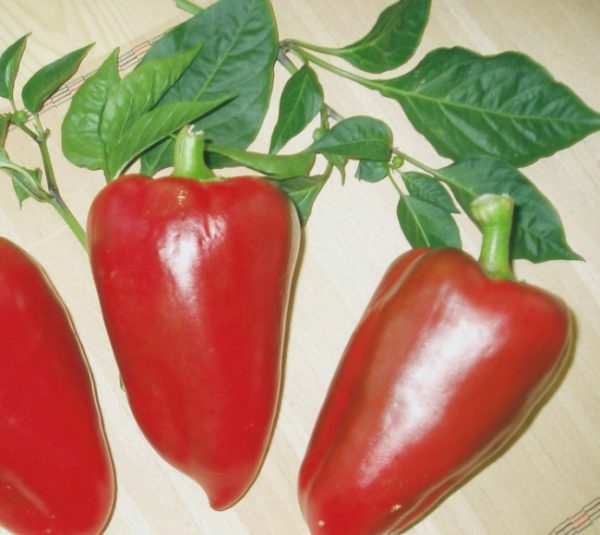
Cone-shaped fruits of good presentation, weighing about 200 g. Ripe early and early (105-115 days), well stored. The pulp in the phase of biological ripeness is dark red. The thickness of the pericarp is average - 5 mm. The bushes are semi-spreading, tall.
Jaguar
Large-fruited, mid-season grade. The shape is cylindrical, the pericarp is thick 8-10 mm. The advantage of the Jaguar is large fruits weighing up to 400 g with a yellow fragrant, juicy pulp.
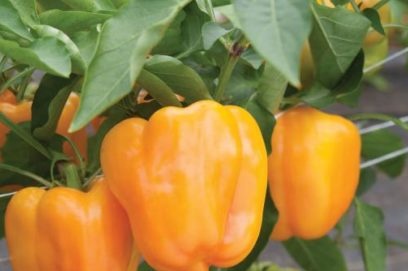
Golden pyramid
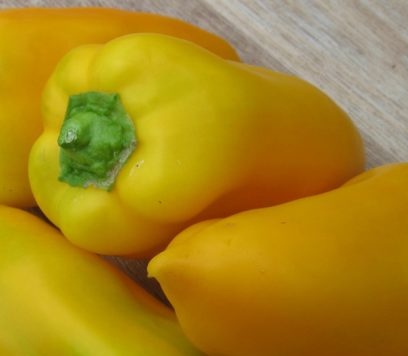
Cold-resistant, early ripening grade. The yield in the garden is 3 kg / m², in the greenhouse - about 6 kg / m². The fruits are yellow, cone-shaped, weighing about 100 g, single specimens weigh 250 g. The walls are thick (up to 8 mm). Bushes are medium-sized.
Fat master
Variety for open and protected ground. Its advantages are thick walls of 8-9 mm, large size and weight (400 g). The fruits have the shape of a truncated cone, painted in bright red color.
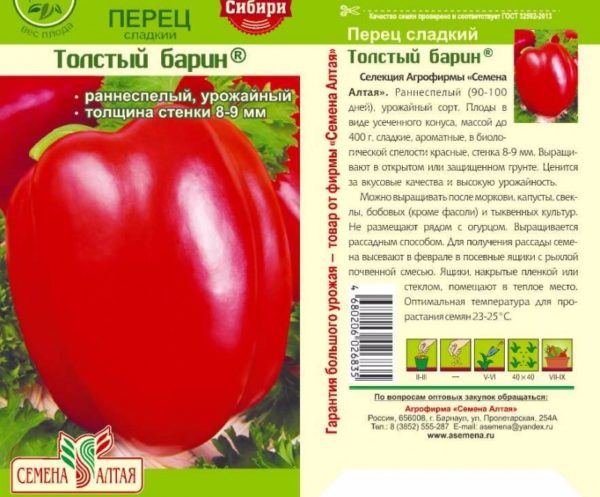
Siberian Express
This pepper is for lovers of fruit of an original form. Pods 25 cm long, narrow. The diameter of the fruit is 4 cm. The color changes from light green in the phase of technical ripeness to orange-red when fully ripened. The pulp is very fragrant.
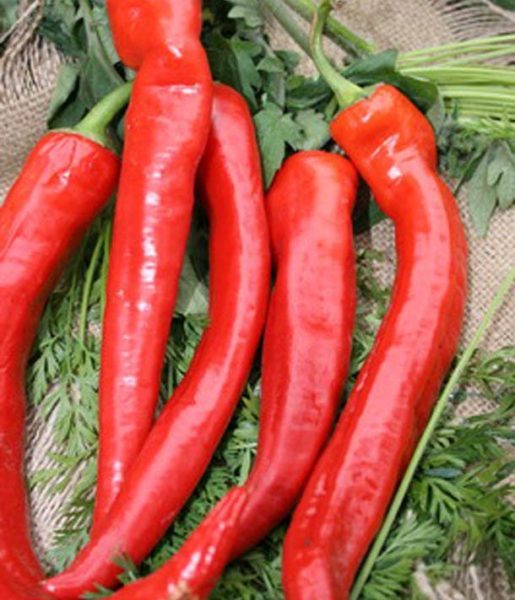
Sinilga
The variety attracts with unusual coloring of peppers. She is lilac purple. The pulp is good for your health. It contains anthocyanins, which strengthen the immune system, strengthen the nervous system. The pericarp is up to 10 mm thick, prismatic fruits weighing 250-300 g. Reviews of Sinilga are difficult to find, the variety has appeared recently.
Oriole
It keeps up to 100-112 days. Bushes semi-spreading type. Oriole pepper is intended for open ground. The advantages of the variety are sweet, bitterness-free, aromatic pulp containing a large percentage of sugars. Ripe golden yellow fruits weighing 120-135 g. The thickness of the pericarp is 7 mm.
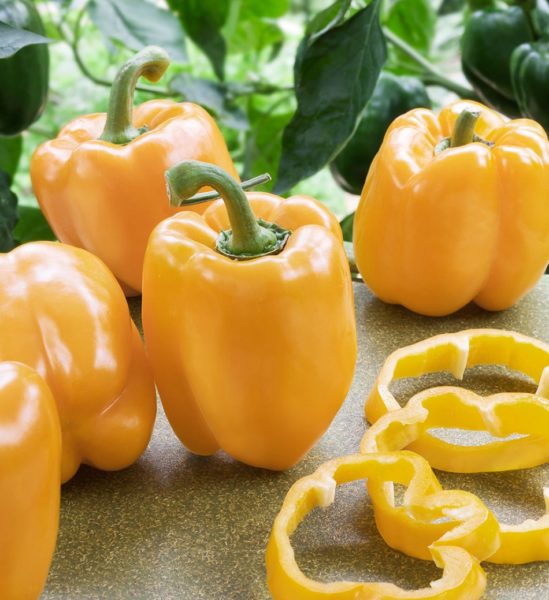
Scimitar
Mid-season variety from Altai breeders, ripen in 120 days. The bushes are semi-spreading, medium height.
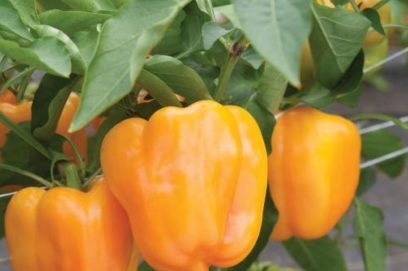
Productivity
For any amateur grower, an indicator of the yield of the variety is important. The final result of many days of work depends on him. A large crop of peppers is the main advantage of any variety.
| Grade | Productivity |
| Scimitar | 3-4 kg / m² |
| Oriole | 11 kg / m² |
| Siberian Express | 1.5 kg / m² |
| Fat master | 7 kg / m² |
| Golden pyramid | 3.1-6.7 kg / m² |
| Jaguar | 3.4-4.2 kg / m² |
| Field Marshal | 7 kg / m² |
| Siberian prince | 1.7-4.2 kg / m² |
Ultra-ripe varieties of peppers
The group of ultra-precocious includes hybrids, the technical ripeness of the fruits of which occurs after 100 days. To get an early harvest, the seeds are sown in separate cups, not dive.
F1 jeepsey
This hybrid form ripens earlier than others, the fruits quickly ripen in the vine. In greenhouses, fruiting to frost. Bushes 50-60 cm tall, moderately sprawling. Due to the abundance of fruits, they can fall apart, so they are tied to a support. Tasty pulp is very fragrant when full ripe red. The shape is regular conical. Dimensions 6 x 15 cm, pericarp thickness 4-5 mm.
Health
Sings for 80-90 days. The plant is tall with cone-shaped, red fruits weighing about 80 g. Pepper tolerates low temperatures, the ovary does not shed. Health Benefits:
- high tying;
- precocity;
- quick adaptation to any weather changes.
F1 Claudio
Peppers large (250 g), thick-walled (10 mm), ripen on 70-72 days. If the weather is not very warm, the ripening period is extended by 10 days. Claudio in the garden and greenhouses. The hybrid shows high resistance to viral and fungal infections.
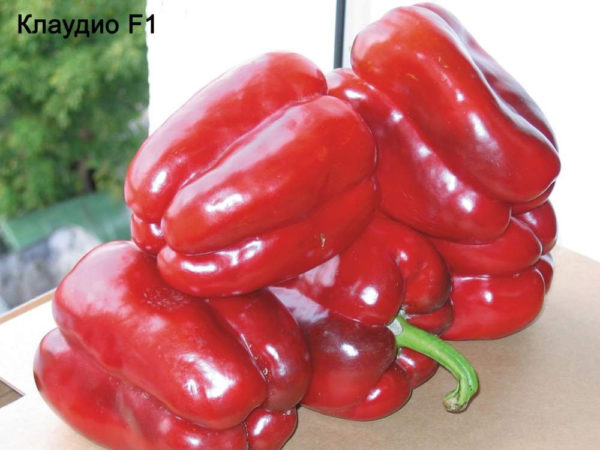
F1 Samander
This hybrid will please the harvest of small (180 g) conical peppers earlier than anyone else. The first fruits can be harvested after 55-65 days. Harvest can be stored for a long time, it does not lose its presentation in transportation. Samander is popular with small farmers.
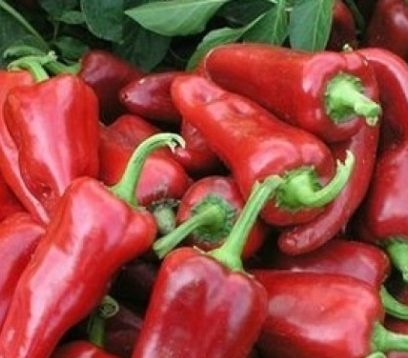
Making a choice is always very difficult. There are many varieties of culture and the characteristics of all are very good. Eyes from such abundance run up. Everyone has one problem - the garden is not rubber and it cannot contain all this wealth, so you need to choose only the best forms of sweet pepper, resistant to disease, quickly adapting to weather changes.

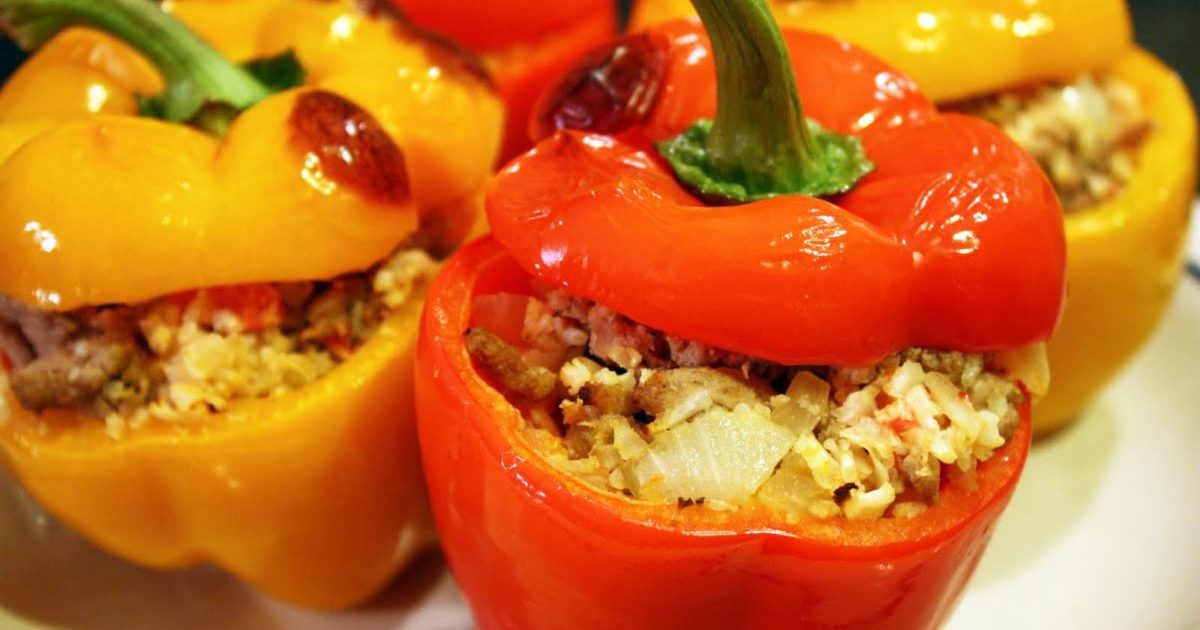 Calorie pepper stuffed with meat and rice - BZHU per 100 grams
Calorie pepper stuffed with meat and rice - BZHU per 100 grams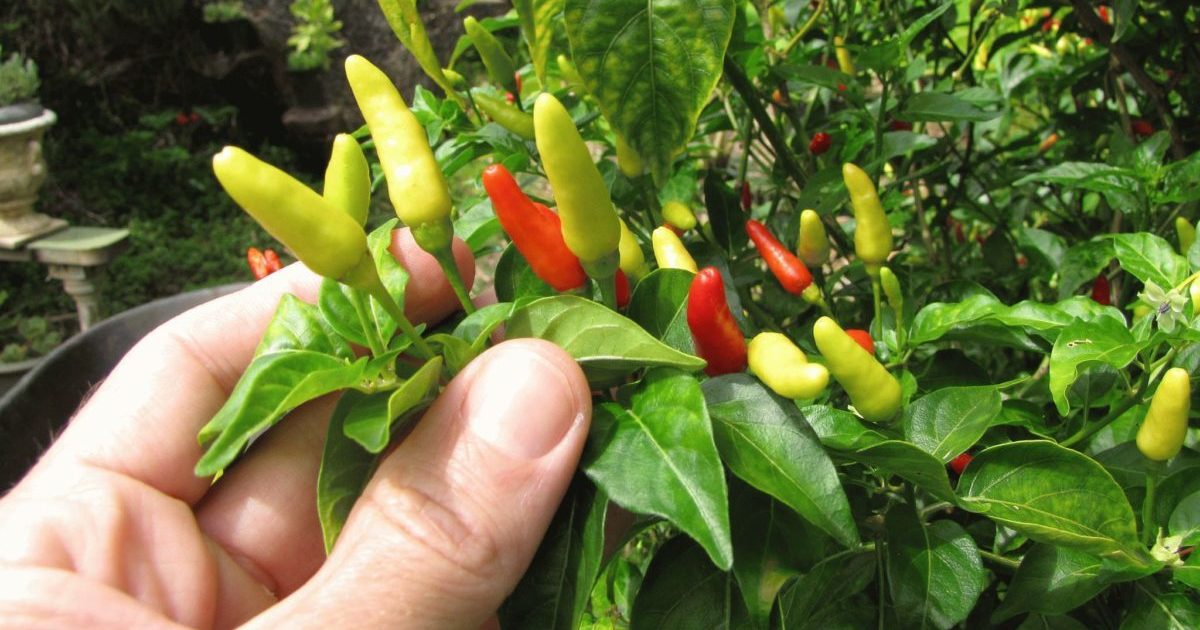 Gorky pepper - the best varieties for open ground
Gorky pepper - the best varieties for open ground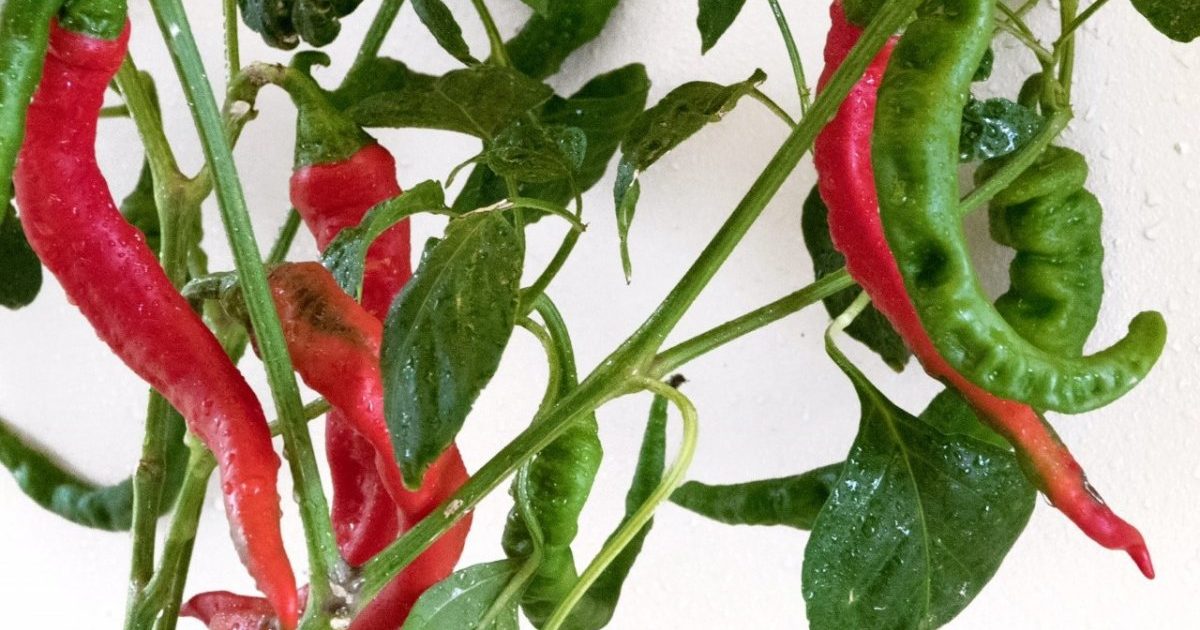 Hot pepper seeds - the best varieties for open ground and reviews
Hot pepper seeds - the best varieties for open ground and reviews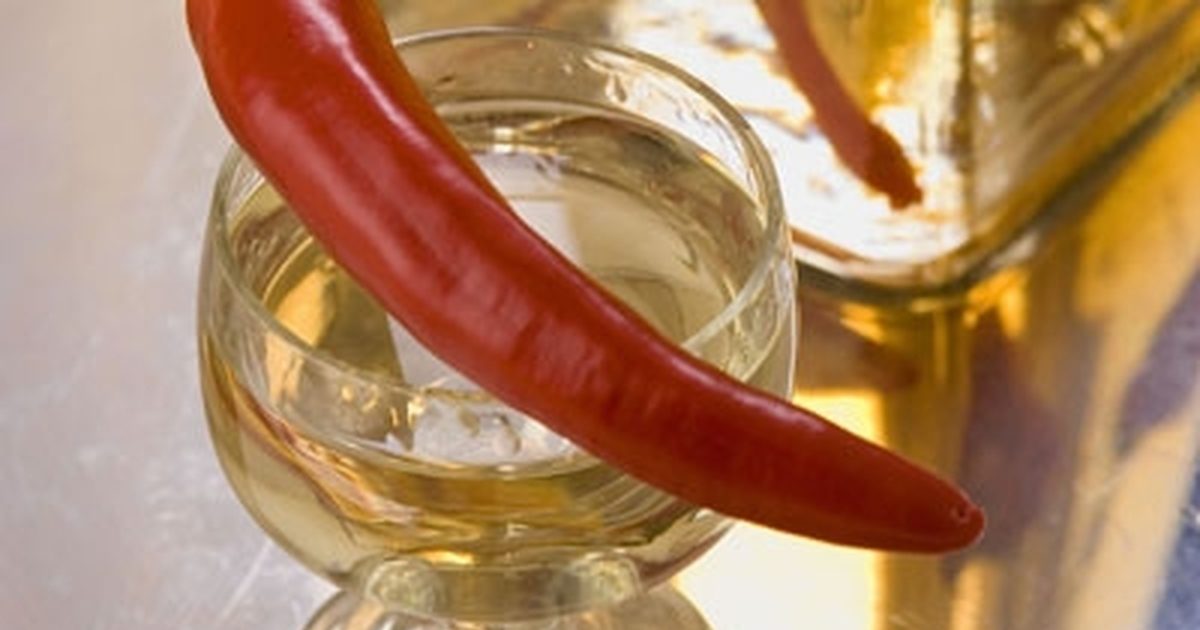 Capsicum tincture for hair - how to use and reviews
Capsicum tincture for hair - how to use and reviews
marina
how and where to order